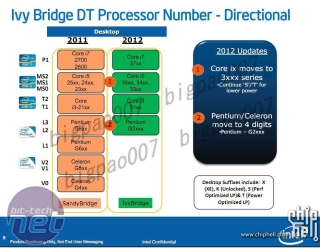
A few slides have leaked onto the internet (well, VR-Zone and now here, at least) that seem legit and detail Intel’s forthcoming Ivy Bridge processor range. Intel looks set to continue its Core i3, i5 and i7 branding, leading to journalists the world over trying to explain why a processor that is apparently three years old is suddenly interesting again.
As expected, the model names of Ivy Bridge processors are said to start with a 3 rather than the 2 of the current Sandy Bridge range. As Sandy Bridge CPUs are being marketed as the Second-Generation Intel Core processors (despite being the fifth distinct range of Intel processors to carry a Core brand) we can expect the Ivy Bridge range to be called the Third-Generation Intel Core processors. Despite Ivy Bridge being a die-shrink and not a new design at all.
On to more pertinent details, and the leaked slides say that top-end CPU will have a TDP of 77W, down from the 95W of the current Sandy Bridge range. We were told that the 22nm, 3D transistor technology being deployed for Ivy Bridge would produce either a 50 per cent power saving for the same frequency, or 37 more frequency for the same power draw.
A bit of rough maths shows the drop from 95W to 77W to be 19 per cent, meaning that we expect frequency to increase by roughly 23 per cent. That could mean that the Core i7-3600K could have a nominal frequency of around 4.2GHz and the Core i5-3500K to be clocked at around 4GHz.
 The VR-Zone story also details some of the cross-compatibility issues between Sandy Bridge and Ivy Bridge. Despite using the same LGA1155 socket, ‘the Q67, Q65 and B65 chipsets will not support Ivy Bridge and if we're correct, this has to do with lack of firmware space. This might once again only be limited to Intel's motherboards though, as the company didn't put large enough flash chips on its motherboards.’
The VR-Zone story also details some of the cross-compatibility issues between Sandy Bridge and Ivy Bridge. Despite using the same LGA1155 socket, ‘the Q67, Q65 and B65 chipsets will not support Ivy Bridge and if we're correct, this has to do with lack of firmware space. This might once again only be limited to Intel's motherboards though, as the company didn't put large enough flash chips on its motherboards.’
The new 7-series chipset that will accompany the Ivy Bridge launch should have no problems working with a Sandy Bridge CPU, ‘as for the Z68, P67, H67 and H61 chipsets, they're all compatible, in theory.’ Ivy Bridge processors are slated for release around March/April 2012.
Looking forward to Intel finally breaking the 4GHz barrier, or annoyed that your board might not be as future-proof as you first thought? Let us know in the forum.
As expected, the model names of Ivy Bridge processors are said to start with a 3 rather than the 2 of the current Sandy Bridge range. As Sandy Bridge CPUs are being marketed as the Second-Generation Intel Core processors (despite being the fifth distinct range of Intel processors to carry a Core brand) we can expect the Ivy Bridge range to be called the Third-Generation Intel Core processors. Despite Ivy Bridge being a die-shrink and not a new design at all.
On to more pertinent details, and the leaked slides say that top-end CPU will have a TDP of 77W, down from the 95W of the current Sandy Bridge range. We were told that the 22nm, 3D transistor technology being deployed for Ivy Bridge would produce either a 50 per cent power saving for the same frequency, or 37 more frequency for the same power draw.
A bit of rough maths shows the drop from 95W to 77W to be 19 per cent, meaning that we expect frequency to increase by roughly 23 per cent. That could mean that the Core i7-3600K could have a nominal frequency of around 4.2GHz and the Core i5-3500K to be clocked at around 4GHz.
 The VR-Zone story also details some of the cross-compatibility issues between Sandy Bridge and Ivy Bridge. Despite using the same LGA1155 socket, ‘the Q67, Q65 and B65 chipsets will not support Ivy Bridge and if we're correct, this has to do with lack of firmware space. This might once again only be limited to Intel's motherboards though, as the company didn't put large enough flash chips on its motherboards.’
The VR-Zone story also details some of the cross-compatibility issues between Sandy Bridge and Ivy Bridge. Despite using the same LGA1155 socket, ‘the Q67, Q65 and B65 chipsets will not support Ivy Bridge and if we're correct, this has to do with lack of firmware space. This might once again only be limited to Intel's motherboards though, as the company didn't put large enough flash chips on its motherboards.’The new 7-series chipset that will accompany the Ivy Bridge launch should have no problems working with a Sandy Bridge CPU, ‘as for the Z68, P67, H67 and H61 chipsets, they're all compatible, in theory.’ Ivy Bridge processors are slated for release around March/April 2012.
Looking forward to Intel finally breaking the 4GHz barrier, or annoyed that your board might not be as future-proof as you first thought? Let us know in the forum.

MSI MPG Velox 100R Chassis Review
October 14 2021 | 15:04








Want to comment? Please log in.